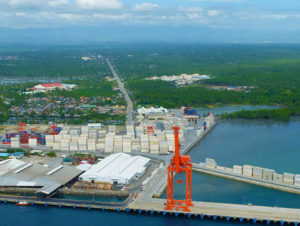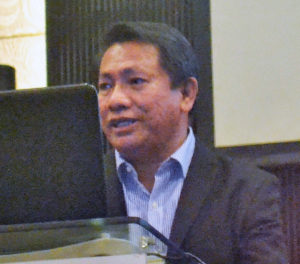 Davao International Container Terminal (DICT) is now only awaiting the release of permits to begin a P2.5-billion expansion project, as the Panabo, Davao Del Sur terminal is already at full capacity after five years in operation.
Davao International Container Terminal (DICT) is now only awaiting the release of permits to begin a P2.5-billion expansion project, as the Panabo, Davao Del Sur terminal is already at full capacity after five years in operation.
DICT’s container yard is currently at almost full capacity with a 96% occupancy rate as volumes have continuously increased over the past few years, said DICT vice president Bonifacio Licayan in an interview with PortCalls on the sidelines of the 10th Philippine Ports and Shipping Conference on February 21.
In 2018, DICT handled 404,953 twenty-foot equivalent units (TEUs), up 17.4% from the 344,975 TEUs in 2017. Though January is usually a slow month, Licayan noted that in January this year, 8% more volumes were handled compared with the same month in 2018. As of February 21, Licayan said yard utilization was at 96%.
Licayan clarified, however, that there is no berth congestion at DICT as “somehow we’re still able to keep schedules,” except for some ships that come late and go off-schedule after being delayed at the Manila port, which is currently congested.
The expansion project involves extending the berth and enlarging the container yard and empty container depot (ECD).

Licayan said the P2.5-billion fund has already been approved by DICT’s Board, and the port operator is just waiting for the necessary permits to kick off the projects.
Under the expansion plan, the berth will be extended by another 150 meters for a total of 573 meters and will be completed one year after construction starts. Licayan said some ships calling DICT are bigger than those calling other ports and occupy the terminal’s two berths. Licayan earlier noted that the average size of vessels calling DICT has increased to 220 meters from the previous average of 160 meters. The terminal sometimes even services 240- to 260-meter vessels. With the berth extension, Licayan said DICT will be able to handle two big ships at the same time.
Meantime, the current 8.8-hectare container yard will be expanded by another 11.25 hectares, and construction might take two years as it involves reclamation works, Licayan said. The expansion will more than double DICT’s annual capacity to around 800,000 TEUs.
For the ECD expansion, construction may start this week and be finished in six to eight months. The expansion will add 3.35 hectares to the current 11.5-hectare ECD that is located 400 meters away from the terminal.
For 2019, Licayan said DICT is optimistic that volumes will increase by no less than 10%.
He said they are surprised that currently, import and export volumes in DICT are 50/50, as opposed to initial expectations of export shipments outnumbering imports. He said that what is most likely happening is that there are more direct calls to Davao instead of shipping lines calling other Philippine ports first.
Exports, meanwhile, are still comprised of 80% fresh produce and 20% dry shipments. For imports, it is still 98% dry shipments and only 2% reefer containers.
Licayan disclosed that due to congestion at the Manila port, a firm has told him of a plan to bring in goods to Davao instead of direct to Manila, and just have domestic vessels transport the goods to Northern Luzon.
Currently, shipments get unloaded in Manila and then transported to final ports of destination in the south by domestic vessels. Many domestic ships go south with full loads, but come back with little to no backloads.
Licayan said unloading in Davao and then transporting via domestic ships may make more commercial sense since there are many, and possibly better, rate options for shipping services going back to the north.
Another surprise for DICT was the surge in “repositioning in” of empty containers in the last quarter of 2018, which averaged 2,000 forty-footers per month.
Licayan suspects that shipping lines are now using Davao as a repair hub for empty containers, as doing this in foreign ports is more expensive. DICT has already talked to shipping lines and told them there is no issue with this as long as they manage and spread the empty containers throughout the whole year so the empties don’t compete with laden shipments. ECD services at DICT include container and pre-trip inspection, washing, maintenance and repair, ventilation and temperature setting, and container releasing.
Licayan earlier said the continuous expansion and upgrading of facilities, equipment, and processes at DICT are geared towards achieving its vision of being “Mindanao’s agro-industrial gateway to global development.” – Text and photo by Roumina Pablo
